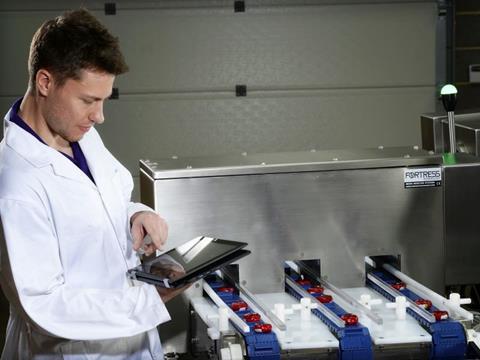
In fast paced, harsh or cramped food production and packing lines, where metal detectors are subject to rigorous washdowns and knocks from operatives, modern machine control panels are especially vulnerable to damage.
Packaging Europe's Editor in chief Tim Sykes reports live from PPMA.
While most are designed to withstand water ingress, Fortress Technology reports that these delicate screens can be a costly item to replace, with machine inoperability caused by a single panel failure significantly impacting line productivity.
The answer, unveiled by the company at PPMA 2017 (stand A42), is take the high risk item out of the environment and manage operations from anywhere in the world using wireless machine-to-machine (M2M) communication on any portable device. Believed to be the first-of-its kind web-based browser, Remote Management Software (RMS) connects multiple Fortress metal detectors to familiar consumer electronics, including mobiles, tablets and laptops.
The rationale is to enhance the reliability, safety and production efficiency within factories while safeguarding valuable machine assets, emphasises Fortress Sales Director and newly appointed MD Phil Brown. He explains: “Traditionally, food inspection OEMs make screen display membranes bigger, easier to use or introduce colour displays to improve communications. Yet, these advances actually make control panels less robust in wet, dusty and harsh production environments, increasing the risk of damage and subsequent machine downtime. Plus, they are more costly to replace.”
When developing the technology, Fortress intentionally moved away from creating an app, as this would have to be hosted, refined and updated on Android and IOS operating systems. Instead, customers can log in and access the system via a local website built within the detector. This in turn means that the detector also has the potential to be accessed from any location in the world.
Ushering in new M2M connectivity eraAlthough widely embraced by consumers, deployment of digital technologies like this has been slower to materialise. Phil attributes this to confusion and lack of confidence about how the Internet of Things (IoT) will unfold in industrial settings and offer end-to-end production visibility with enhanced due diligence.
At PPMA 2017, Phil demonstrates how straightforward it is to monitor and connect machines via a single gateway. Using a three-lane Fortress multi-aperture metal detector to illustrate how the software talks to each metal detector individually, Phil logged into the RMS browser from a laptop and mobile phone.
Walking visitors through the screens, he showed how reports can be exported on demand, in Excel or PDF format. “This data output provides fully traceable Quality Assurance information, detailing what and when an event happened on a specific metal detector,” explains Phil.
Activity reports can be selected for a specific production line and/or time period. For record keeping, event and performance information is stored securely and remotely for a minimum of 10 years, with the option to extend storage capability to 20+ years. Each event is automatically time stamped to comply with Hazard Analysis and Critical Control Point (HACCP) food safety management systems and principles.
For large or multi-site factories, this level of oversight is especially helpful for supporting flexible production. It means one operative or production manager can monitor all their company’s metal detectors, analysing comparative data for different inspection zones, side-by-side.
An unlimited number of Fortress metal detectors can be connected wirelessly using a powerful back-end SQL to monitor activity and generate reports.
“When it comes to digitisation in the food factories of the future, data analytics and intelligence will be central,” notes Phil. “With RMS, Fortress is helping to bridge the gap between consumer and industrial technology and theory and commercialisation.”
Aside from safeguarding valuable local machine assets, having software that connects metal detectors wherever they are located in the world means that multinational organisations can stay in touch with operations in remote manufacturing hubs or politically volatile regions. “Having centralised control enables food manufacturers to analyse machine performance across multiple sites and troubleshoot technology issues, without having to be physically in front of machine,” adds Phil.
RMS is being installed as standard on all new Fortress Interceptor metal detectors from 2018, and is available as an option on all new Stealth machines. In keeping with Fortress’s ‘Never Obsolete’ commitment, existing Stealth metal detectors in the field can also be upgraded.
To discover more, visit the Fortress team at PPMA 2017, stand A42.
More info:












